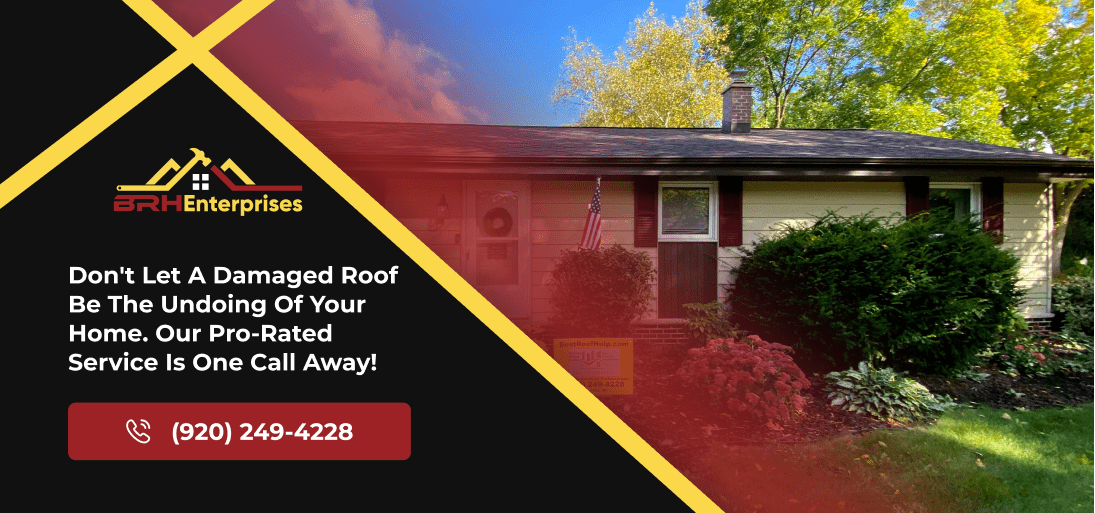All You Need To Know About Roof Insulation And The Top Products In Just 5 Minutes
Estimated Reading Time : 8 Min.

Discover the key to energy efficiency and ultimate comfort with our concise guide to roof insulation and top products. In just five minutes, we’ll equip you with all the knowledge you need to make informed decisions about insulating your roof. Get ready to transform your home with optimal insulation solutions!
What Is Roof Insulation?
Heat always flows from areas of high temperature to areas of low temperature. This natural process of heat transfer occurs due to conditional differences between various points in space. To impede the movement of heat and other forms of energy from one area to another, we require materials that have poor heat conductivity, known as insulators.
Insulators are substances that hinder the transmission of heat, sound, electrical current, and other forms of energy. A prime example of a natural insulator is wood, which restricts heat flow by trapping air pockets within its structure.
Insulators possess certain characteristics, including their natural properties and R-value. The R-value of a material indicates its resistance to heat transfer. Materials with higher R-values tend to prevent less heat through their material.
Roof insulation functions in a similar manner, as it is designed to prevent heat transfer between the attic and exterior of a home. These insulators either absorb or reflect a significant portion of the energy from the sun. By limiting the transmission of solar heat, they enhance energy efficiency in a home and help reduce energy bills. The primary purpose of installing roof insulation is to improve energy efficiency and lower energy costs.
Why Do You Need Roof Insulation?
Insulation plays an essential role in your roofing system which is why its installation is crucial. The following reasons will help you understand the importance of insulation to your roofing system.
Energy Efficiency
The primary reason professional roofers suggest adding roof insulation is to maximize a home’s energy efficiency and keep it cool while limiting the use of the HVAC system. The insulation controls the amount of heat entering the home and makes it easier for the air conditioner to cool the home down. In the winter months, the roof insulation prevents the escape of heat from the building and keeps it warm throughout the day. Because of this, the HVAC system works less to cool or warm the home and therefore uses less energy to operate. This results in reduced energy bills.
Comfort
Properly insulated roofs provide a more comfortable living or working environment by preventing extreme temperature fluctuations. It helps maintain consistent and preferred indoor temperatures throughout the year, enhancing occupant comfort and well-being.
Soundproofing
As we mentioned in the beginning, insulation materials reduce the intensity of heat and sound. Roof insulation helps create a calm and pleasant environment, keeping noise outside the home. It helps to absorb and dampen sound waves from falling rain and hail, especially if you have a metal roof, creating a quieter indoor environment and improving acoustics.
Environmental Benefits
Roof insulation plays a significant role in reducing carbon emissions and combating climate change. By reducing the need for excessive heating or cooling, it helps to lower energy consumption and decrease greenhouse gas emissions.
How Roof And Attic Insulation Are Different
While roof and attic insulation are both forms of insulation that serve the same purpose, they are located in different parts of a home.
When we talk about roof insulation, we mean the materials that are placed on the underside of the roof, below the roof deck but above the rafters in an attic. The main purpose of roof insulation is to stop heat from moving between the inside and outside of a building. This way, the inside stays cool in the heat of summer and warm when the temperature drops in winter. Roof insulation helps you save energy, feel comfortable indoors, and makes buildings more energy efficient.
Attic insulation, though similar, is placed on the floors or walls of the attic, which is the space right below the roof. Attic insulation creates a thermal barrier between the attic and the living space underneath. It stops heat from going from the attic to the living area, keeping the inside comfortable and lowering energy bills.
What Does The R-Value of Insulation Signify?
The R-value of insulation signifies how well the insulation material can resist the flow of heat. The higher the R-value, the better the material is at preventing heat loss or gain through the building envelope. The R-value depends on the type, thickness, and density of the insulation material, as well as the exterior temperatures and moisture conditions.
The R-value is an important factor in choosing the best insulation material for different parts of the building, such as walls, ceilings, floors, and roofs. Different parts of the building may require different R-values depending on the climate and the design of the building. Overall, the R-value can help you save energy, improve livability, and protect your roof from damage caused by heat transfer.
Top Roof Insulation Products
1. Fiberglass Insulation
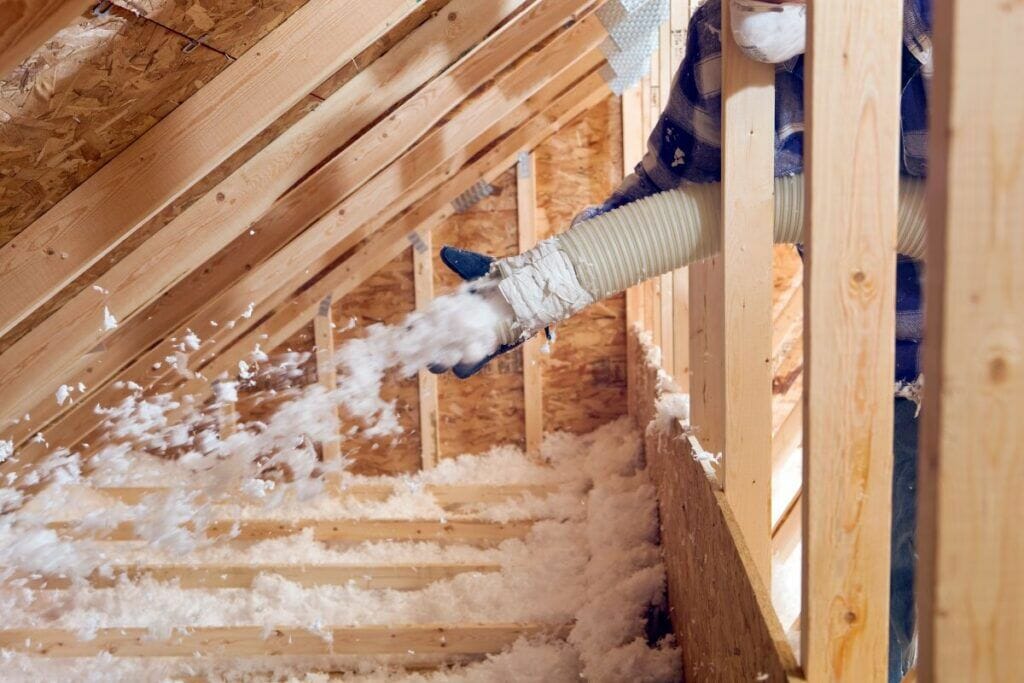
Fiberglass insulation is made of tiny glass fibers and is one of the most commonly used types of insulation. It comes in rolls or batts and is relatively inexpensive. Fiberglass insulation effectively reduces heat transfer and is known for being moisture and fire-retardant.
Pros
- Relatively inexpensive
- Good thermal performance
- Resistant to moisture and fire
- Easy to install
Cons
- Can cause skin irritation if not handled properly
- Prone to air leakage if not installed correctly
- May settle over time, reducing its effectiveness
Typical R-value: R-2.9 to R-3.8 per inch.
2. Cellulose Insulation
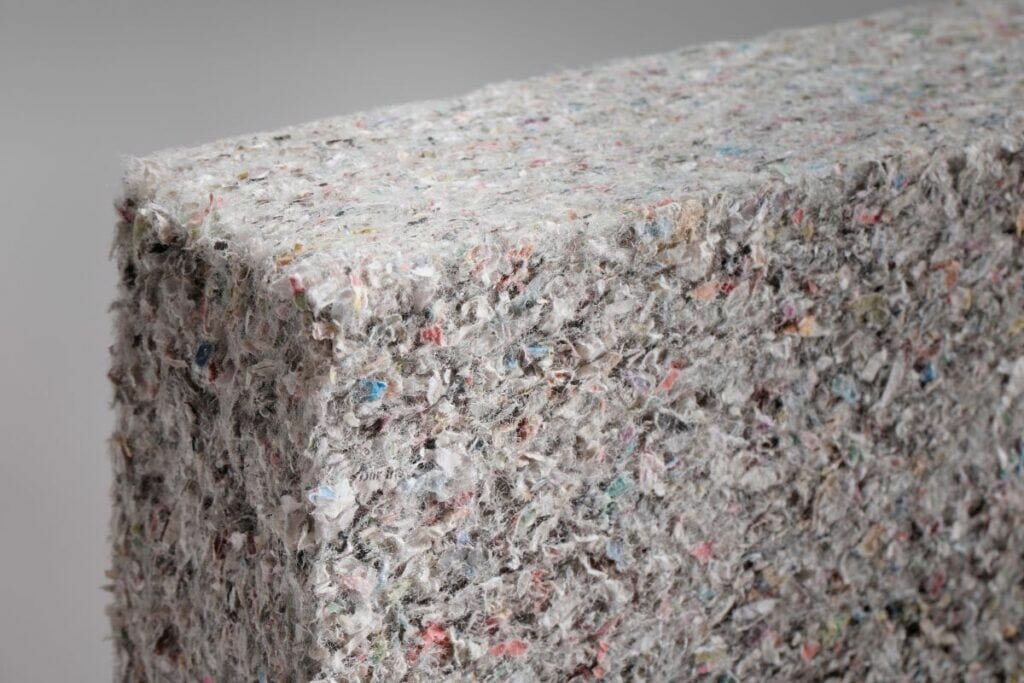
Cellulose insulation, available in loose-fill or dense-pack forms, is made from recycled paper treated to be flame resistant. It is installed by being blown into attics or enclosed spaces. Cellulose insulation has good thermal properties and is environmentally friendly.
Pros
- Made from recycled materials
- Good thermal performance
- Effective at reducing air leakage
- Fire retardant
Cons
- Can be more expensive than fiberglass
- Prone to settling over time
- May absorb moisture if not properly protected
Typical R-value: R-3.2 to R-3.8 per inch.
3. Spray Foam Insulation
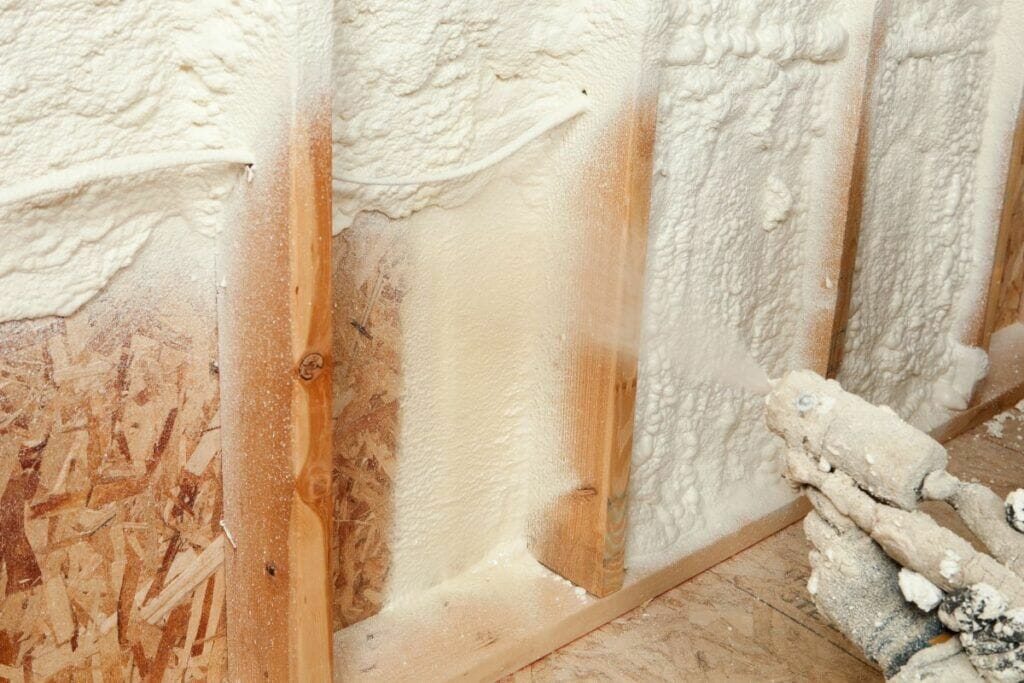
Spray foam insulation is a type of polyurethane foam that is sprayed within the attic. It expands and solidifies, creating an airtight seal. Spray foam insulation provides excellent insulation and air-sealing properties, but it can be more expensive than other options.
Pros
- Has highly rated air-sealing and insulating properties
- Expands and fills gaps, creating a seamless barrier
- Can improve structural integrity
- Resistant to moisture and mold growth
Cons
- Higher cost compared to other insulation types
- Requires professional installation due to the application process
- Can release harmful fumes during installation
Typical R-value: R-6.0 to R-7.0 per inch.
4. Reflective Insulation
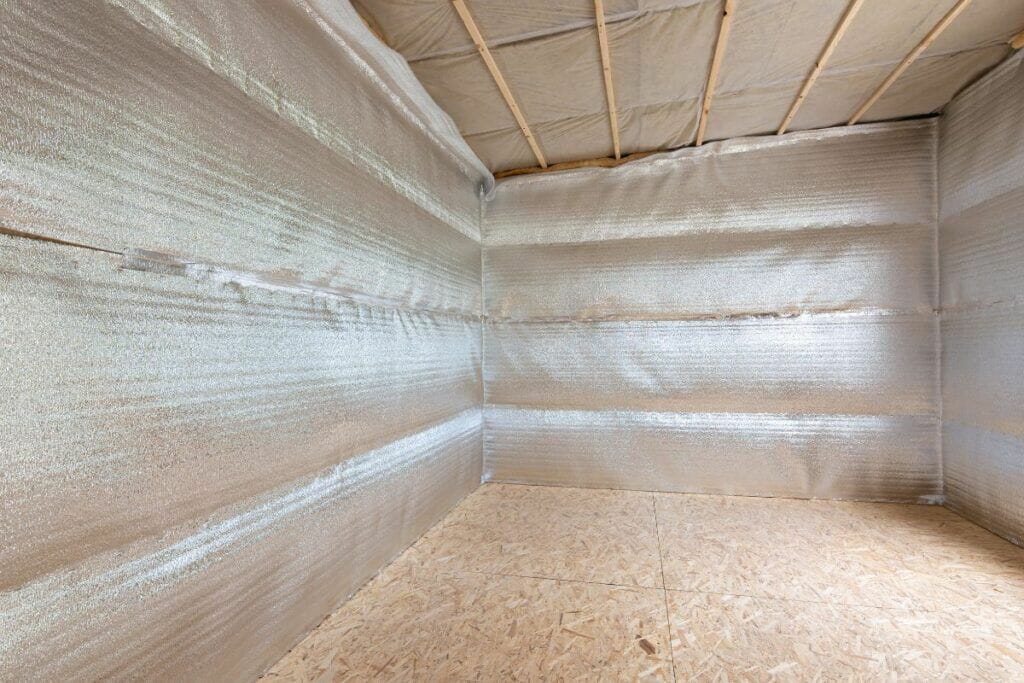
Reflective insulation consists of a mirroring surface, often made of aluminum, which repels radiant heat. It is typically installed in the form of foil-faced panels or sheets. Reflective insulation is effective at reducing heat gain in hot climates or during the summer months.
Pros
- Effectively reflects heat radiation, reducing the overall temperature
- Improves energy efficiency in hot climates
- Lightweight and easy to install
- Durable and long-lasting
Cons
- Less effective in cold climates where heat retention is desired
- Relies on proper installation with air gaps for optimal performance
- Can be more expensive than some other insulation types
Typical R-value: R-3.0 to R-6.0.
5. Rigid Foam Insulation
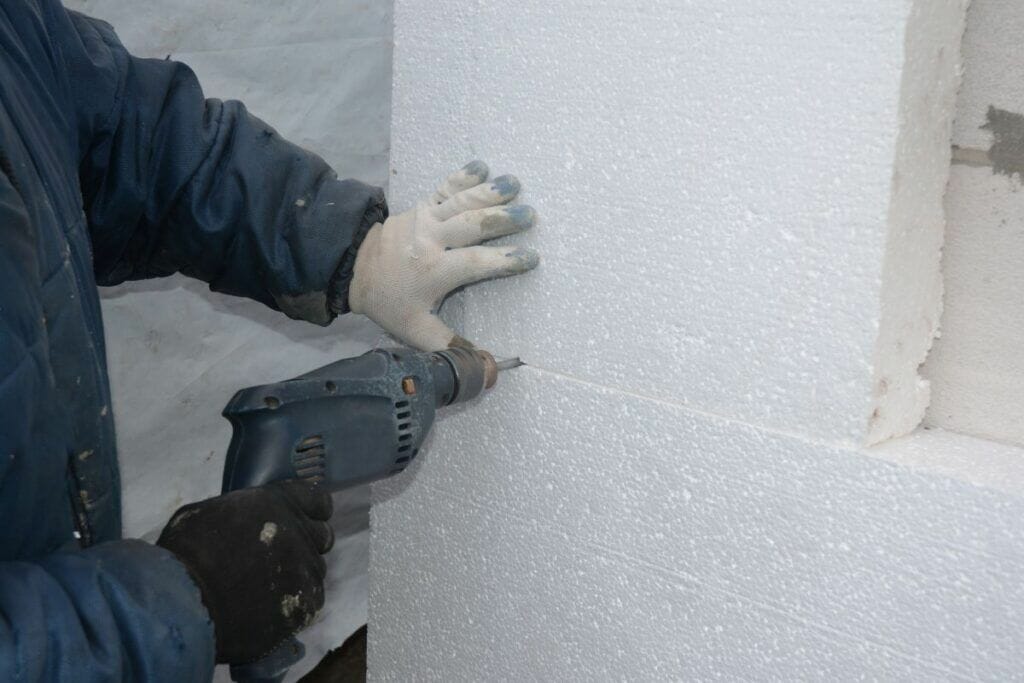
Rigid foam insulation, available in different types such as expanded polystyrene (EPS), extruded polystyrene (XPS), and polyisocyanurate (ISO), is a lightweight and durable insulation material. Rigid foam insulation has a high R-value and can also provide moisture resistance.
Pros
- High R-value per inch, providing excellent insulation
- Resistant to moisture and mold growth
- Durable and long-lasting
- Can improve structural strength
Cons:
- Higher cost compared to other insulation types
- Not as flexible or easy to install as other materials
- May require additional protective measures for fire safety
Typical R-value: R-4.0 to R-8.0 per inch.
How To Choose The Right Insulation For Your Roof
1. Climate Considerations
Since you have to protect your home and roof from the adverse effects of the climate, such as high heat, freezing cold, and moisture, one of your first considerations should be one of the weather patterns in your area. In colder regions, you should consider insulations with high R-value, as they envelop the roof perfectly and insulate heat better. On the other hand, in hot areas, you should install insulation with high reflective properties.
2. Moisture Resistance
It’s common for moisture to form and become trapped under roofing materials and the structure, which can lead to significant roof damage. Therefore, it is crucial to install materials with excellent moisture resistance properties. Moisture can lead to mold growth, deterioration of insulation, and even structural damage. Look for insulation that is resistant to water absorption and has a vapor retarder or moisture barrier to protect against moisture intrusion.
3. Installation Requirements
Choosing roof insulation also depends on the roofing materials you have installed, the roofer’s recommendation, and the installation requirements. Different types of roof insulation may have specific installation requirements. Consider factors such as the complexity of installation, compatibility with your roof structure, and whether it requires professional installation or can be done as a DIY project. Some insulation materials may require specialized equipment or techniques, so it’s important to evaluate the installation requirements before making a choice.
4. Cost Considerations
Roof insulation is a kind of investment that pays you back in the long run. But, as said earlier, the durability, performance, and effectiveness of the insulation solely rely on its quality, thickness, and R-value. The better the quality of insulation, the longer it will bring more value to your home. We recommend high-quality insulation, but ultimately your decision relies on your budget and the kind of investment you want to make. Many homeowners, due to lack of information, may make the cost of insulation a priority, and choose low-quality roofing insulation materials. Though they are inexpensive, these don’t protect a roof for very long and fail when encountering high heat transmission and extreme cold.
However, with our professional assistance, homeowners can make a budget-friendly and informed decision. We never let our clients settle for low-quality insulation, instead, we help them evaluate the initial cost of the material and any installation costs if applicable.
Maintenance And Upkeep
1. Inspecting Insulation For Damage And Wear
Regular inspection of roof insulation is a must to detect any sign of damage, wear and tear, pest infestation, mold, and mildew growth. Along with the roof, inspect the surrounding areas for moisture and water infiltration. It will help you repair or replace your roof insulation before it gets completely damaged and causes further issues to the roofing deck.
2. Repairing And Replacing Damaged Insulation
The moment you detect any sign of damage to your roof insulation, you must take prompt action to repair or replace it. Acting quickly will reduce the chance of it being completely damaged or worn out. It will also help you increase the effectiveness of your roof insulation.
Inspect And Replace Your Roof Insulation With Professional Assistance
Up to this point, we have been looking at types of roof insulation, their pros and cons, the R-value of each, and factors to help you make an informed decision. We also want to remind you that regardless of the insulation you choose its effectiveness, and lifespan depends on proper and professional roof insulation. Therefore, we recommend you choose our company to install your insulation. At BRH Enterprises, we are a team of professional and dedicated roofers, equipped with the right information and skills. Our quality roof inspections and installation techniques help you live your life more comfortably. Call us today at (920)-249-4228 for a consultation with one of our experts.
